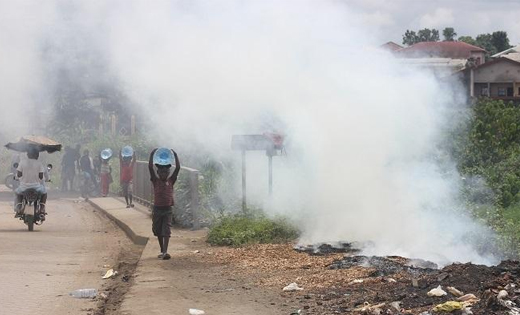Research Round-up – January 2021
Welcome to the latest instalment of our monthly feature series throwing the spotlight on our research success stories.
The strength of our research is in making a real and telling difference to the world around us, by working across traditional boundaries to find innovative solutions to some of the greatest challenges facing society today.
Here we highlight some of latest projects being pioneered by the expertise and efforts of the highly talented research community at Leeds.
From grant awards to examples of outstanding interdisciplinary work and best practice, we’re keen to showcase your research achievements. See the foot of this article for details of how you can get involved.
Featured in this month's round-up:
- Robotic revolution for urban nature
- Burning question at the heart of global waste
- Unravelling the process that makes viruses infectious
- New technologies in the fight against cancer
- Brief encounters: how fleeting protein interactions shape health
- Sainsbury’s partnership announced
- Heart patients ‘fearful’ of seeking medical help amid covid-19 crisis
- Thousands may have undiagnosed bowel cancer
- Better ways to manage virus explored by new trials
- ‘Compelling case’ to level-up economy through rail innovation
- Literature Project Award to support a new collaborative project
- Plan S guidelines now in effect
- Join the Engaged Research Microsoft Team
- How to feature in future research round ups
 Autonomous vehicles and drones may help reduce pollution and traffic congestion, making towns and cities more pleasant places to spend time outside
Autonomous vehicles and drones may help reduce pollution and traffic congestion, making towns and cities more pleasant places to spend time outside
Robotic revolution for urban nature
Drones, robots and autonomous systems can transform the natural world around cities for people and wildlife.
International research, involving more than 170 experts and led by Leeds, assessed the opportunities and challenges that this cutting-edge technology could have for urban nature and green spaces.
The researchers highlighted opportunities to improve how we monitor nature, such as identifying emerging pests and ensuring plants are cared for, as well as helping people engage with and appreciate the natural world around them.
As robotics, autonomous vehicles and drones become more widely used across cities, pollution and traffic congestion may reduce, making towns and cities more pleasant places to spend time outside.
But the researchers also warned that advances in robotics and automation could be damaging to the environment.
Lead author, Dr Martin Dallimer, from the School of Earth and Environment, said: “Technology, such as robotics, has the potential to change almost every aspect of our lives.
“As a society, it is vital that we proactively try to understand any possible side effects and risks of our growing use of robots and automated systems.”
These technologies have many potential applications, such as autonomous transport, waste collection, infrastructure maintenance and repair, policing and precision agriculture.
The research was conducted as part of Leeds’ Self Repairing Cities project, which aims to enable robots and autonomous systems to maintain urban infrastructure without causing disruption to citizens.
Open burning is a huge public health challenge we cannot afford to keep ignoring
Burning question at the heart of global waste
Up to one billion tonnes of solid waste is being openly burned worldwide each year and risks the health of “tens of millions of people”, according to a review of the latest scientific evidence.
That amounts to about half of all the solid waste generated on earth.
Open burning produces a range of potentially toxic emissions that endanger people who live and work near where the material is being openly burned, often in low to middle-income countries. That includes 11 million informal waste workers, known as ‘waste pickers’ – men, women and children – who play a pivotal role in collecting and recycling waste material.
The research was led by Leeds’ Dr Costas Velis and Ed Cook for Engineering X, a collaboration founded by the Royal Academy of Engineering and the Lloyd’s Register Foundation to help solve some of the biggest problems facing humankind.
The focus of the research was to investigate what happens to electronic devices, consumer goods, medical devices, machines and other man-made goods – so called engineered products – at the end of their useful life.
The findings reveal how discarded man-made waste feeds into the vast mountain of solid waste generated globally.
Although robust figures do not exist, top-end estimates suggest that about one billion tonnes of waste are openly burned each year. The researchers call for more data analysis and research.
Ed Cook, Research Fellow in the School of Civil Engineering and an expert in the management of waste materials, said: “Many people don’t have access to a waste collection service. Burning it stops the waste from smelling or attracting vermin. We can’t just tell people to stop – we have to help communities implement alternative options.”
The review makes recommendations for urgent action to mitigate harm, including reducing or replacing the use of some materials, such as catalytic metals, in products that are likely to be burned.
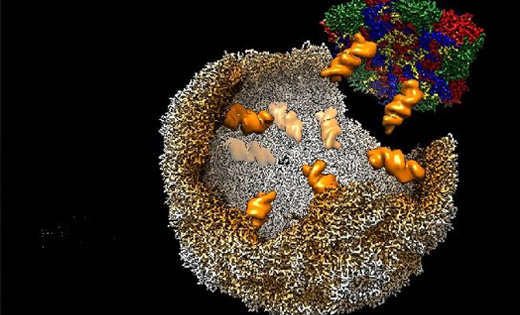
This study opens up the possibility of a better understanding of how to control some viral diseases
Unravelling the process that makes viruses infectious
Researchers have for the first time identified the way viruses – like the poliovirus and the common cold virus – ‘package up’ their genetic code, allowing them to infect cells.
The findings of the study by a team from Leeds and the University of York, open up the possibility that drugs or anti-viral agents can be developed that would stop such infections.
Once a cell is infected, a virus needs to spread its genetic material to other cells. This is a complex process involving the creation of what are known as virions – newly-formed infectious copies of the virus. Each virion is a protein shell containing a complete copy of the virus’s genetic code. The virions can then go on and infect other cells, causing disease. What has been a mystery until now is a detailed understanding of the way the virus assembles these daughter virions.
Professor Peter Stockley, former Director of the Astbury Centre for Structural Molecular Biology at Leeds, who part supervised the research with Professor Reidun Twarock from York, said: “This study is extremely important because of the way it shifts our thinking about how we can control some viral diseases.
“If we can disrupt the mechanism of virion formation, then there is the potential to stop an infection in its tracks.”
The research at Leeds and York brings together experts in the molecular structure of viruses, electron microscopy and mathematical biology.
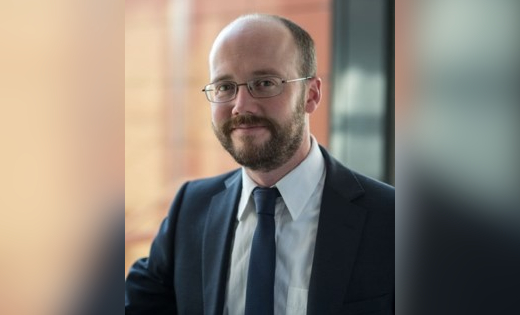
The development of revolutionary future treatments will allow non-destructive access to the pancreas’ intricate sensitive internal anatomy
New technologies in the fight against cancer
A research team spanning three faculties at Leeds have been awarded new research funding from the Engineering and Physical Sciences Research Council.
Led by Professor Russell Harris, from the School of Mechanical Engineering, the £2 million project – entitled ‘New minimally invasive technologies for the treatment of pancreatic cancer’ – will begin this year.
With the successful treatment of pancreatic cancer seeing relatively few improvements compared to other forms of cancer, Leeds researchers will focus on novel digital manufacturing processes and robotics, conducted in partnership with leading clinicians and industry. The development of revolutionary future treatments will save lives by allowing non-destructive access to the pancreas’ intricate sensitive internal anatomy.
Professor Harris said: “Our vision is to challenge the mind-set of pancreatic cancer being a prognosis of limited options and high mortality, and to enable revolutionary future treatments that will save lives and allow patients to live without major side-effects.
“I am pleased that our platform manufacturing research and the preliminary investigations undertaken by the project team have successfully made the case for a substantial research undertaking in this field. It is great to work at Leeds where we have such cross-disciplinary research strengths and shared ambitions that have come together to investigate and develop such an important area.”
Find out more, including details of the research team behind this project
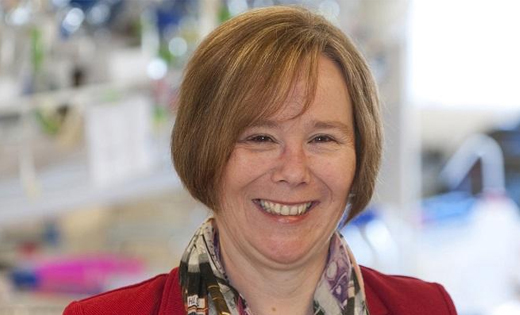
Professor Sheena Radford to receive the Research Professorship - the premier award made by the Royal Society
Brief encounters: how fleeting protein interactions shape health
The UK’s leading scientific academy – the Royal Society – has announced that Professor Sheena Radford is to receive one of its most prestigious research awards.
The Research Professorship will enable Professor Radford, Director of the Astbury Centre for Structural Molecular Biology, to develop new techniques to “see the unseen” and reveal the way that proteins interact to shape or to destroy memories.
The study will focus on one of the big unanswered questions in biology: the role that a protein structure called amyloid plays in both building memories that can last for decades – but also in the devastating memory loss experienced by people with neurodegenerative diseases.
To conduct the research, Professor Radford and her team will first have to develop new experimental techniques to allow scientists to visualise the processes where proteins come together with each other and interact with other components within a cell.
Her work will lay the foundation for one of the first research hubs in the world, to be based at Leeds, that will map protein interactions, allowing scientists to understand those interactions necessary for a healthy life and those that cause disease. Incorrect interactions are known to be crucial factors in diseases spanning cancer, cardiovascular disease, diabetes and dementia.
Professor Radford said: “The aim of the research is to develop new experimental approaches that will enable us to visualise and map those interactions in real-time within cells and tissues.
“When we have that information, we can begin to understand how the complex choreography of protein molecules gives rise to healthy life, and how aberrant protein behaviour can cause disease.”
The Research Professorship is the premier award made by the Royal Society. It goes to internationally acclaimed scientists who are undertaking important and original research, and it allows them to be released from other duties to focus on their research.
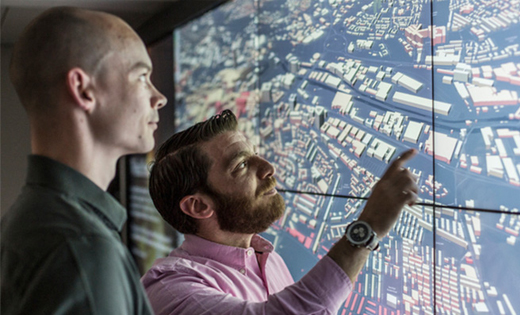
LIDA researchers bring data science expertise and specialist knowledge from a range of academic domains to understand human behaviour
Sainsbury’s partnership announced
Leeds Institute for Data Analytics (LIDA) and Sainsbury’s have formalised a partnership to deliver data-intensive research projects in nutrition and health, property and location analytics, and e-commerce.
Teams from both organisations will work together on challenges aligned with Sainsbury’s Net Zero strategy, which also offer the potential for academic advancement and the opportunity to generate valuable societal insights.
The partnership, which builds on ten years of successful collaboration between Leeds and Sainsbury’s, will formalise working practices and provide associated researchers with access to dedicated virtual research environments.
Professor Mark Birkin, LIDA Co-Director, said: “LIDA does not undertake research in isolation. Our aim is to use data to tackle real-world challenges and to do this we benefit enormously from working in partnership with the organisations facing those challenges.
“Formalising our relationship with Sainsbury’s was a natural progression for LIDA, building on a successful history of collaboration and a shared commitment to using data, in a safe and secure way, to better understand human behaviour.”
There are several projects underway that are already generating insights into consumer behaviours, using anonymised transaction data.
While each project is different, all are co-produced, with teams from LIDA and Sainsbury’s involved throughout the research lifecycle.
The project teams are both cross-sectoral and multidisciplinary, with LIDA researchers bringing data science expertise and specialist knowledge from a range of academic domains. In contrast, the Sainsbury’s team provides extensive commercial expertise and anonymised contextual data extracts.
Find our more about the partnership

Patient numbers fell sharply as the numbers of covid-19 infections began to surge ahead of the second lockdown in early November 2020
Heart patients ‘fearful’ of seeking medical help amid covid-19 crisis
Data analysis by researchers at Leeds is revealing a second sharp drop in the number of people admitted to hospital in England with acute heart failure or a heart attack.
The decline may be linked to patients being reluctant to go to a hospital out of a fear of contracting covid-19.
Patient numbers declined sharply during the first wave of the pandemic and although they did rebound, they never returned to the levels seen before the pandemic. They began to fall sharply again as the numbers of covid-19 infections began to surge ahead of the second lockdown in early November 2020.
From the beginning of October to 17 November, there was a 41% decline in admissions for people with heart failure and 34% with a heart attack – reductions similar to those seen during the first wave of the pandemic and that may have contributed to more than 2,000 excess deaths in England and Wales.
In the findings letter, the scientists note: “The second dip appears of similar magnitude to that of the first, and signals that the public are fearful of attending hospital despite having medical emergencies...”
Chris Gale, Professor of Cardiovascular Medicine and Co-Director of the LIDA, supervised the data analysis. He said: “I am afraid that we are seeing a re-run of one of the preventable tragedies of the first wave – people were either too afraid to go to hospital for fear of contracting covid-19 or were not referred for treatment.”
Dr Jianhua Wu, Associate Professor at Leeds, led the analysis. He said: “One of the worrying aspects of our research is that the decline we have seen since October may not have yet bottomed out. Inevitably, there is a fear that will result in deaths that perhaps could have been avoided.”
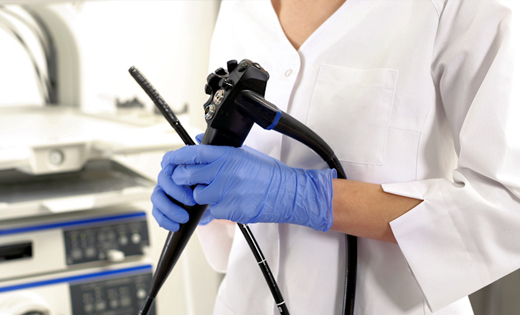
The study assesses the impact of the COVID-19 pandemic on the diagnosis and management of bowel cancer across England
Thousands may have undiagnosed bowel cancer
A new study involving Leeds has found the number of people diagnosed with bowel cancer in England has fallen sharply since the first coronavirus lockdown.
Between April and October 2020, more than 3,500 fewer patients than expected were diagnosed with bowel cancer in England. Since bowel cancer is more likely to be curable if it is detected at an early stage, these results suggest that many patients – whose diagnosis has yet to be made – may die unnecessarily.
Co-author, Dr Katie Spencer, said: “As a result of the coronavirus pandemic first wave, the NHS National Bowel Cancer Screening Programme was paused, and surgical capacity to treat patients was limited.
“It is very concerning that the improvements we had been seeing because of the early detection of bowel cancer are likely to have been set back during this time, and we need to ensure that patients continue to come forward so we can keep making progress in fighting this disease.”
The research was carried out by a team of clinicians and academic researchers from across the UK, including from the University of Oxford and the University of Newcastle.
This is the first study to assess the impact of the covid-19 pandemic on the diagnosis and management of bowel cancer across England.

The 18-month study will determine whether the simple blood test could be used to diagnose bacterial infections in covid-19 patients
Better ways to manage virus explored by new trials
Two new research programmes aimed at reducing the effects and transmission of covid-19 have been announced.
In the first study, researchers will evaluate whether a simple blood test for bacterial infection could reduce the need to dispense antibiotics to patients with the virus.
The second trial will explore if wearable digital devices can help reduce covid-19 infections and prevent deaths in care homes.
The trials are among nine awarded a total of £5.5 million from the National Institute of Health Research (NIHR), as part of its covid-19 Recovery and Learning call to manage current and future waves and investigate the long-term impacts of the pandemic on the health and care system.
Currently, three quarters of patients admitted to hospital with suspected or confirmed covid-19 are given antibiotics because of concerns they may have secondary bacterial infections. But antibiotics have no effect on viral infections – and published data shows low levels of bacterial infections in covid-19 patients.
The 18-month study will determine whether the simple blood test, which detects the presence of biomarker procalcitonin, could be used to diagnose bacterial infections in covid-19 patients by looking at UK hospital data from the first wave.
It is hoped the findings will inform care during subsequent waves of infection and lead to the development of recommendations for procalcitonin use in the NHS.
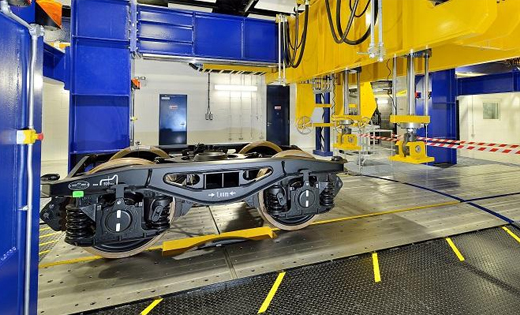
The call to use rail innovation as a means of economic development comes as the Government makes substantial investments in rail infrastructure
‘Compelling case’ to level-up economy through rail innovation
Greater investment in rail research could be used to help level-up the economy in the north of England, according to a report by economics and policy analysts Perspective Economics.
According to the study, there is a “compelling case” for further investment in rail innovation in the region that could drive “economic recovery and longer-term industrial advancement and economic growth”.
Commissioned by Leeds and the University of Huddersfield, it describes a “collective appetite among academia and industry to drive research”. There are hundreds of companies in the north of England already actively involved in rail industry research, development and innovation – and universities with advanced rail-test facilities and expertise and a strong record of collaboration with the rail industry on research.
The call to use rail innovation as a means of economic development comes as the Government makes substantial investments in rail infrastructure through HS2 and upgrades to the East Coast Main Line, linking London to Yorkshire and Scotland, and the Transpennine route between Manchester, Leeds and York. That investment could amount to £200 billion over two decades.
Between them, the two universities have been involved in more than 400 rail research projects, generating about £100 million in research income, of which half came from partnerships directly with the rail industry.
Leeds is developing an Institute for High-Speed Rail and System Integration, which will be one of the most advanced experimental test and development facilities in the world. Building work was started but then paused with the arrival of covid-19 in the UK – and the timing of the construction of the research and testing facilities will be influenced by the ongoing pandemic.
Both universities can draw on wider research knowledge from disciplines including materials, robotics, data analysis, artificial intelligence, mechanical engineering and advanced manufacturing.
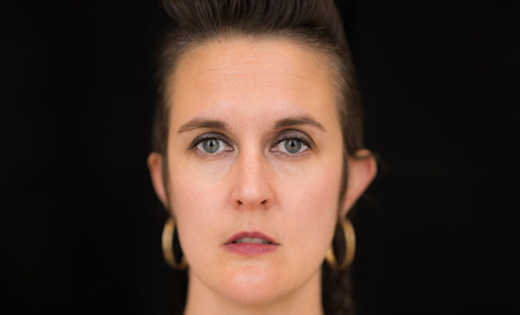
Dr Campanello has been awarded the Literature Project Award
Literature Project Award to support a new collaborative project
Congratulations to Dr Kimberly Campanello, from the School of English, who has been awarded Arts Council Ireland funding to support a new collaborative project.
The Arts Council Ireland introduced the Literature Project Award in recognition of the changing landscape for literary work in Ireland, aiming to support projects that connect literature with readers and audiences. It allows writers and illustrators to research, develop and create work in new and innovative ways.
Poets Dr Campanello and Christodoulos Makris have been awarded the Literature Project Award to collaboratively explore space-time dimensions of travel in the age of the digital/anthropocene.
The project will explore how the two dimensions of travel (space-time) work across each other by writing in dialogue with Italo Calvino’s foundational experimental novel ‘Invisible Cities’, using the novel’s key headings as a framework to navigate the space-time of the digital map and search engine.
Dublin-based digital publisher Fallow Media will disseminate the result through a discrete digital publication, to be released later this year.
Discover more about the project
Plan S guidelines now in effect
New Open Access initiative Plan S came into force on the 1 January 2021.
It’s backed by a consortium of national research agencies, funders and charitable organisations across the globe and aims to reform the academic publishing system, so that research is made freely available to everyone from the point of publication.
If you are funded by Wellcome, Bill and Melinda Gates Foundation, European Commission, World Health Organisation, the Research Council of Norway or any other Plan S funders, you need to comply with the new aligned policies.
Please note that UKRI’s Plan S-aligned Open Access policy is expected in spring 2021.
There are a number of routes that researchers can take to ensure Plan S compliance.
Journal Checker Tool is available to researchers for guidance on how they can comply with their funder’s Plan S-aligned Open Access policy when seeking to publish in the journal of their choice.
Plan S sets out a number of core principles, including that under the Plan S rights retention strategy, you can publish in any journal, ‘hybrid’ or subscription, and deposit your Author Accepted Manuscript with zero embargo. This is green open access and incurs no charge. You can also select a journal that has a zero-embargo policy.
Plan S funders will not support the ‘hybrid’ publishing model unless they have signed up to a ‘transformative agreement’ or ‘transformative journal’ to change their business model to full open access.
Plan S funders will cease funding APCs for hybrid altogether from 2024.
Please contact the Research Support Team if you have any questions regarding Plan S.
Join the Engaged Research Microsoft Team
The Engaged Research Microsoft Team is a dedicated virtual space that brings together everyone who is involved, or interested in engagement with research.
It’s a more than 600-strong community and the go-to place for all things related to engagement with research, with channels dedicated to public engagement, policy engagement, resources, training and – new for 2021 – a patient involvement channel.
Members of the Engaged Research Team can attend meetings and interactive sessions throughout the academic year to share best practices related to research engagement.
To join, open Microsoft Teams and select ‘Join or create a team’. When prompted, enter the code fc84jre. An administrator will then approve your request – all are welcome!
How to feature in future research round ups
Please contact Internal Communications if you or one of your colleagues would like to appear in this monthly feature.
Posted in: University news